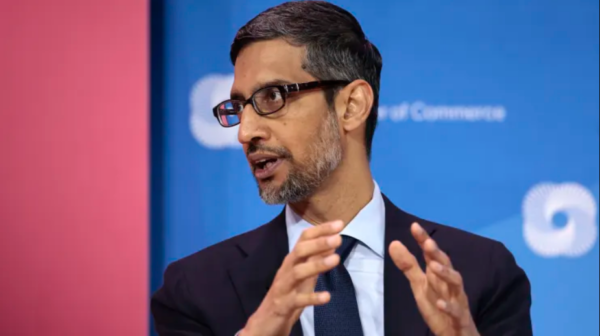Sundar Pichai, the CEO of Google and Alphabet, stated that “every product of every company” will be affected by the rapid development of artificial intelligence, and that society must prepare for technologies similar to those it has already introduced.
In an interview with CBS’s “60 Minutes” that aired on Sunday with a concerned tone, interviewer Scott Pelley attempted several of Google’s artificial intelligence (AI) projects and said he was “speechless” and found it “unsettling,” alluding to the human-like capabilities of products such as Google’s chatbot Bard.
“We need to adapt as a society,” Pichai told Pelley, adding that “knowledge workers” such as writers, accountants, architects, and, paradoxically, even software engineers, would be displaced by AI.
Google CEO Sundar Pichai said on Sunday’s “60 Minutes” that society isn’t ready for AI’s rapid development.
Pichai stated, “This will affect every product in every company.” “For instance, if you’re a radiologist in the next five to ten years, you’ll have an AI assistant. When you arrive in the morning, if you have a hundred items to review, it may state, “These are the most urgent cases you need to review first.”
Pelley observed other Google divisions with sophisticated AI products, including DeepMind, where self-taught machines were playing soccer as opposed to humans. Another unit demonstrated robots that recognized objects on a countertop and retrieved an apple Pelley requested.
Pichai, in a warning about the repercussions of AI, stated that the scope of the problem of disinformation, false news, and images will be “much larger” and that “it could cause harm.”
AI restrictions are “not for a company to decide,” Pichai stated.
CNBC reported last month that Pichai told employees that the viability of the newly-launched Bard program is now dependent on public testing and that “things will go wrong.”

Google released an experimental version of its AI chatbot Bard to the public last month. It followed Microsoft’s January announcement that its Bing search engine would incorporate OpenAI’s GPT technology, which garnered international attention following ChatGPT’s 2022 launch.
In recent weeks, the public and critics have also voiced concerns about the consequences of the accelerated advancement. In March, Elon Musk, Steve Wozniak, and dozens of academics demanded an immediate halt to “experiments” involving the training of large language models “more powerful than GPT-4,” the premier LLM of OpenAI. Since then, over 250,000 individuals have signed the letter.
“Competitive pressure among giants like Google and startups you’ve never heard of is propelling humanity into the future, whether we’re ready or not,” Pelley stated in the segment.
Google has released a document with “recommendations for regulating AI,” but Pichai stated that society must swiftly adapt with regulation, laws to punish abuse, and international treaties to make AI secure for the world, as well as rules that “Align with human values including morality.”
Warning of consequences, he said AI will impact “every product of every company.”
Pichai stated, “It is not for a company to decide.” “Therefore, I believe the development of this must involve not only engineers but also social scientists, ethicists, and so on.”

When asked if society is prepared for AI technologies such as Bard, Pichai responded, “On the one hand, I feel no, because the pace at which we can think and adapt as societal institutions seems to be out of sync with the pace at which the technology is evolving.”
However, he added that he is optimistic because, compared to other technologies in the past, “the number of people who have started worrying about the implications” did so early on.
From a six-word prompt by Pelley, Bard devised a story with characters and a narrative, including a man whose wife was unable to conceive and a stranger seeking closure after a miscarriage. “I am rarely speechless,” said Pelley. “The humanity moving at superhuman speed was a shock.”
Pelley stated that when he questioned Bard why it benefits people, Bard responded, “Because it makes me happy,” which shocked Pelley. “Bard appears to be thinking,” he told James Manyika, a senior vice president at Google who was recruited last year to oversee “technology and society.” Manyika replied that Bard is not conscious or sentient, but it can “behave like” it.
After Pelley explained that he queried Bard about inflation and received an immediate response with recommendations for five books that did not exist, Pichai stated that Bard frequently hallucinates.
Pichai’s statement that there is a “black box” with chatbots, where “you don’t fully understand” why or how it generates certain responses, elicited concern from Pelley.
“You don’t fully comprehend how it operates, yet you’ve unleashed it on society?” Pelley inquired.
Pichai responded, “Let me put it this way: I do not believe we fully comprehend how the human mind functions.”

